
- •CONTENTS
- •PREFACE
- •Content—Benefits for Students
- •Content—Benefits for Instructors
- •Features of the Book for Students and Instructors
- •Supplementary Materials
- •Acknowledgments
- •What Is Hospitality Management?
- •The Manager’s Role in the Hospitality Industry
- •Why Study in a Hospitality Management Program?
- •Planning a Career
- •Employment as an Important Part of Your Education
- •Getting a Job
- •Employment at Graduation
- •The Outlook for Hospitality
- •Summary
- •Managing Change
- •Demand
- •Supply
- •Workforce Diversity
- •The Impact of Labor Scarcity
- •Summary
- •The Varied Field of Food Service
- •The Restaurant Business
- •The Dining Market and the Eating Market
- •Contemporary Popular-Priced Restaurants
- •Restaurants as Part of a Larger Business
- •Summary
- •Restaurant Operations
- •Making a Profit in Food Service Operations
- •Life in the Restaurant Business
- •Summary
- •Chain Restaurant Systems
- •Independent Restaurants
- •Franchised Restaurants
- •Summary
- •Competitive Conditions in Food Service
- •The Marketing Mix
- •Competition with Other Industries
- •Summary
- •Self-Operated Facilities
- •Managed-Services Companies
- •Business and Industry Food Service
- •College and University Food Service
- •Health Care Food Service
- •School and Community Food Service
- •Other Segments
- •Vending
- •Summary
- •Consumer Concerns
- •Food Service and the Environment
- •Technology
- •Summary
- •The Evolution of Lodging
- •Classifications of Hotel Properties
- •Types of Travelers
- •Anticipating Guest Needs in Providing Hospitality Service
- •Service, Service, Service
- •Summary
- •Major Functional Departments
- •The Rooms Side of the House
- •Hotel Food and Beverage Operations
- •Staff and Support Departments
- •Income and Expense Patterns and Control
- •Entry Ports and Careers
- •Summary
- •The Economics of the Hotel Business
- •Dimensions of the Hotel Investment Decision
- •Summary
- •The Conditions of Competition
- •The Marketing Mix in Lodging
- •Product in a Segmented Market
- •Price and Pricing Tactics
- •Place—and Places
- •Promotion: Marketing Communication
- •Summary
- •The Importance of Tourism
- •Travel Trends
- •The Economic Significance of Tourism
- •The United States as an International Tourist Attraction
- •Businesses Serving the Traveler
- •Noneconomic Effects of Tourism
- •Summary
- •Motives and Destinations
- •Mass-Market Tourism
- •Planned Play Environments
- •Casinos and Gaming
- •Urban Entertainment Centers
- •Temporary Attractions: Fairs and Festivals
- •Natural Environments
- •On a Lighter Note. . .
- •Summary
- •Management and Supervision
- •The Economizing Society
- •The Managerial Revolution
- •Management: A Dynamic Force in a Changing Industry
- •What Is Management?
- •Summary
- •Why Study Planning?
- •Planning in Organizations
- •Goal Setting
- •Planning in Operations
- •The Individual Worker as Planner
- •Long-Range Planning Tools
- •Summary
- •Authority: The Cement of Organizations
- •Departmentalization
- •Line and Staff
- •Issues in Organizing
- •Summary
- •Issues in Human-Resources Management
- •Fitting People to Jobs
- •Recruiting
- •Selection and Employment
- •Training
- •Retaining Employees
- •Staff Planning
- •Summary
- •The Importance of Control
- •Control and the “Cybernetic Loop”
- •Tools for Control
- •Summary
- •Leadership as Viewed by Social Scientists
- •Why People Follow
- •Leadership Theories
- •Communication
- •The Elements of Leading and Directing
- •Developing Your Own Leadership Style
- •Summary
- •A Study of Service
- •Rendering Personal Service
- •Managing the Service Transaction
- •How Companies Organize for Service
- •Summary
- •INDEX
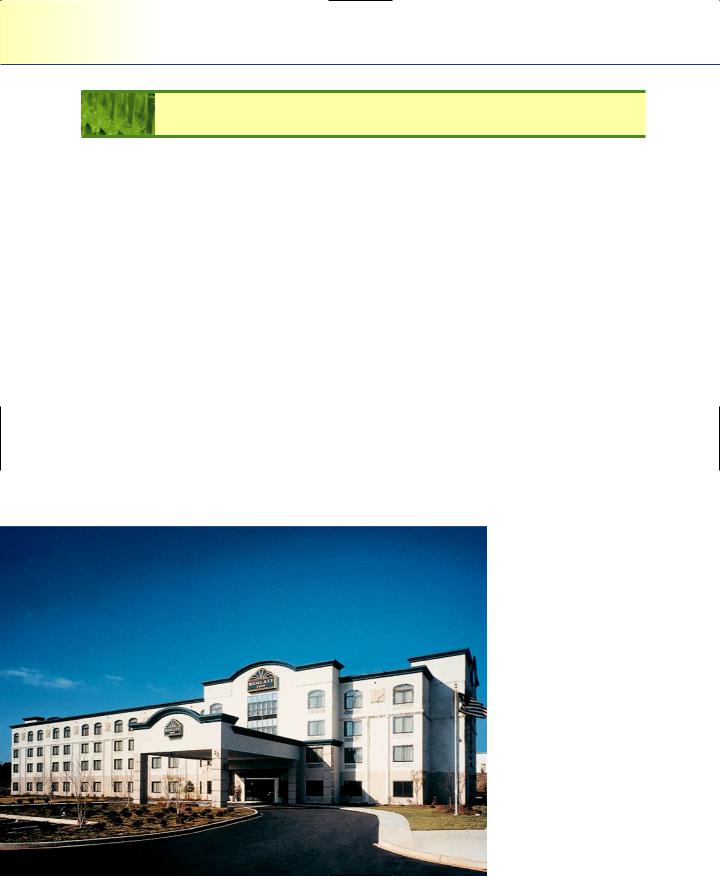
304 |
Chapter 10 Hotel and Lodging Operations |
Major Functional Departments
Hotel properties range in size from small to huge. Although large properties such as Chicago’s Hilton and Towers or the Tower Suites at Wynn Las Vegas catch the public’s imagination, the majority of properties in the United States have under 300 units. Because most students will gain their work experience in this kind of property,
the examples in this chapter will assume a hotel in the 100to 300-unit range. Surprisingly enough, most properties perform basically the same functions, but the
way in which they accomplish them varies with the property size. When there are significant variations in routine practices in larger properties, we will note them. Our emphasis, however, will be on the similarities found throughout the hotel business rather than on the variations.
Figure 10.1 shows the basic functional areas of a typical hotel. This figure includes elements not found in some operations, as some hotels lack food and beverage departments and many do not have a gift shop or garage. Our purpose, however, is not to draw a chart that represents all properties inclusively; that would be impossible. Rather, we have outlined the major activities usually present in most properties.
A large property may employ a general manager, under whom a hotel manager or resident manager assumes responsibility for day-to-day operations. There is often a rooms director who supervises the departments that make up the rooms division and a food and beverage director who oversees the departments in that division. Other key
Hotels perform essentially the same functions, no matter their size. However, size does influence how certain functions are carried out. (Courtesy of Cendant Corp.)

Major Functional Departments |
305 |
|
|
|
|
|
|
|
|
|
General manager |
|
|
|
|
|
|
|
|
|
|
|||||||
|
|
|
|
|
|
|
|
|
|
|
|
|
|
|
|
|
|
|
|
|
|
|
|
|
|
|
|
|
|
|
|
|
|
|
|
|
|
|
|
Staff and support activities |
|
|
|
||||||||||
|
|
|
|
|
|
|
|
|
|
|
|
|
|
Accounting |
|
|
|
|
|
|
|
|||||
|
|
|
|
|
|
|
|
|
|
|
|
|
|
Engineering |
|
|
|
|
|
|
|
|||||
|
|
|
|
|
|
|
|
|
|
|
|
|
|
Marketing |
|
|
|
|
|
|
|
|||||
|
|
|
|
|
|
|
|
|
|
|
|
|
|
Security |
|
|
|
|
|
|
|
|||||
|
|
|
|
|
|
|
|
|
|
|
|
|
|
Human resources |
|
|
|
|||||||||
|
|
|
|
|
|
|
|
|
|
|
|
|
|
|
|
|
|
|
|
|
|
|
|
|
|
|
|
|
|
|
|
|
|
|
|
|
|
|
|
|
|
|
|
|
|
|
|
|
|
|
|
|
|
|
|
|
Rooms |
|
|
|
Miscellaneous |
|
|
|
Food and |
|
|
|
|
|||||||||||
|
|
|
|
|
|
|
|
operated |
|
|
|
beverage |
|
|
|
|
|
|||||||||
|
|
|
division |
|
|
|
|
|
|
|
|
|
|
|
|
|||||||||||
|
|
|
|
|
|
departments |
|
|
|
department |
|
|
|
|
|
|||||||||||
|
|
|
|
|
|
|
|
|
|
|
|
|
|
|
|
|||||||||||
|
|
|
|
|
|
|
|
|
|
|
|
Telephone |
|
|
|
|
|
|
|
|
|
|
|
|
||
|
|
|
|
|
|
|
|
|
|
|
|
|
|
|
|
|
|
|
|
|
|
|
|
|||
|
|
|
|
|
|
|
|
|
|
|
|
Gift shop |
|
|
|
|
|
|
|
|
|
|
|
|
||
|
|
|
|
|
|
|
|
|
|
|
|
|
|
|
|
|
|
|
|
|
|
|
|
|||
|
|
|
|
|
|
|
|
|
|
|
|
Garage, etc. |
|
|
|
|
|
|
|
|||||||
|
|
|
|
|
|
|
|
|
|
|
|
|
|
|
|
|
|
|
||||||||
|
|
|
|
|
|
|
|
|
|
|
|
|
|
|
|
|
|
|
|
|
|
|
|
|
|
|
|
|
|
|
|
|
|
|
|
|
|
|
|
|
|
|
|
|
|
|
|
|
|
|
|
|
|
Front |
|
Uniform |
|
Housekeeping |
|
|
Food |
|
|
Restaurants |
|
Banquet |
||||||||||||||
desk |
|
services |
|
|
production |
|
|
|
||||||||||||||||||
|
|
|
|
|
|
|
|
|
|
|
|
|
|
|
|
|
||||||||||
|
|
|
|
|
|
|
|
|
|
|
|
|
|
|
|
|
|
|
|
|
|
|
|
|
|
|
|
|
|
|
|
|
|
|
|
|
|
|
|
|
|
|
|
|
|
|
|
|
|
|
|
|
|
|
|
|
|
|
|
|
|
|
|
|
|
|
|
|
|
|
|
|
|
|
|
|
|
|
|
|
|
|
|
|
|
|
|
|
|
|
|
|
|
|
|
|
Cocktail |
|
|
Room |
|
|
|
|
|||
|
|
|
|
|
|
|
|
|
|
|
|
|
|
|
|
lounge |
|
|
service |
|
|
|
|
|||
|
|
|
|
|
|
|
|
|
|
|
|
|
|
|
|
|
|
|
|
|
|
|
|
|
|
|
Figure 10.1
Major functional areas found in hotels.
members of the management team or executive committee of a large hotel include a director of sales and marketing, controller, director of human resources, and the chief engineer. Many hotels also include the executive chef, executive housekeeper, and director of catering as part of the management team.
On the other hand, in the 100-unit inn diagrammed in Figure 10.2, the general manager may be responsible—with an executive housekeeper and perhaps a front-office manager or supervisor—for running the rooms departments and for supervising an assistant manager responsible for food and beverage if the property contains a restaurant. At one extreme, in the small property, the executive staff may consist of two or three persons supported by a few department heads or supervisors and key employees. On the other hand, a large property requires a complex organization with several layers of authority.
It is important to note that a smaller property may have functional areas (food production, beverage department or bar, dining room, stewarding [dish room, pot washing, cleanup], and receiving, for instance, in the food and beverage area) but no true department heads. The restaurant in a small inn may be run by a restaurant manager who directly supervises all the employees with help from lead employees in each functional area on each shift. For instance, the hosts or hostesses for the day and evening shifts may
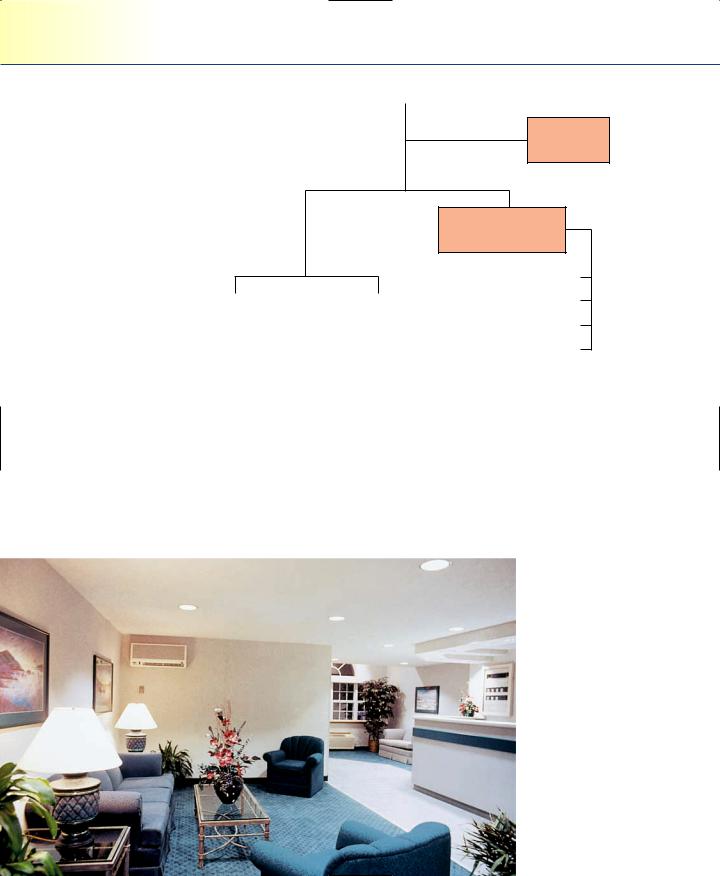
306 |
Chapter 10 Hotel and Lodging Operations |
General manager
Housekeeping |
Front office |
Figure 10.2
Functional operational chart for a small hotel.
Support departments
Assistant manager (restaurant manager)
Food preparation
Dining room
Bartenders
Desh, pot, receiving, and cleanup
provide leadership to the dining room staff during their shifts; a head cook on each shift does the same for the kitchen staff. The manager may be responsible for both shifts, usually along with someone designated as an assistant when the manager is off duty. This arrangement is economical and convenient in small properties as long as the restaurant manager delegates enough responsibility to avoid becoming overcommitted.
Lobbies are important in creating first impressions, as in this Microtel hotel. (Courtesy of U.S. Franchise Systems.)

The Rooms Side of the House |
307 |
The Rooms Side of the House
Room rental is a hotel’s main business and its major source of profit. In larger hotels, the day-to-day operation of the typical rooms division yields departmental income (the revenue remaining after the direct operating costs of the departments in the division) of 70 percent or more, compared with 15 to 20 percent for the food and beverage department. Thus, the people on the rooms side of the house are crucial to the
operation’s financial success.
THE FRONT OFFICE
More than any other group, the front-desk employees represent the hotel to its guests. There are various position titles for the employees who check guests in and out of the hotel. Some hotels refer to these employees as front-desk receptionists, while others use front-desk agents or clerks. The front-desk receptionists have an integral role in determining guests’ first impressions and last impressions of the hotel property. The attentive, warm greeting of a front-desk receptionist can have a tremendous impact in making the guest feel welcomed. If something goes wrong, most guests will complain first to the front desk. When the guests leave, the desk clerks check them out. If anything has gone wrong, this will be a good time to catch it (“I hope you enjoyed your stay”—and then listen to the answer). Although the duties of the desk differ somewhat by shift, they also, to an extent, overlap.
In the following discussion, a small hotel serves as a model. Our purpose is to describe the work of the front office and its functions. Your own observations will illustrate for you the variety of ways in which the work is organized.
The morning clerk typically works from 6:45 A.M. to 3:15 P.M. With a half-hour meal break, this is an eight-hour day. Because the evening crew comes in at 2:45 P.M. and the night auditor goes off duty at 7:15 A.M., all shifts overlap so as to ensure a smooth transition. Some properties maintain a logbook in which information or events with which later shifts should be familiar are noted. This logbook could also take the form of an automated database of information from shift to shift. The new shift’s first task upon coming on duty is to check the logbook to make sure everyone is fully briefed.
The morning shift’s work is concentrated in the early hours (from around 7:30 A.M. until midmorning) on checking out guests. At the same time, of course, the employees on this shift answer guests’ questions and perform other routine tasks. Most hotel properties require check-out by a certain time, typically by 10 A.M. to 11 A.M., to facilitate cleaning and preparing the room for the next guest’s arrival. A guest may request a later check-out time through the front office with approval typically depending on the number and estimated arrival of incoming guests.

308 |
Chapter 10 Hotel and Lodging Operations |
When a guest is ready to leave, the clerk verifies the final amount of the bill, posts any recent charges, and assists the guest in settling with cash, check, or credit card, according to the house credit policy. This credit policy, which lays down guidelines for accepting checks and specifies the acceptable credit cards, is an important part of any clerk’s training.
Although the technical aspects of the clerk’s work are important, the courtesy a clerk accords a guest is of tremendous importance. A departing guest must have an opportunity to register complaints if he or she has had problems. The morning clerk’s work thus includes a special responsibility for ensuring that guests leave with the intention of returning to the hotel on their next visit to town. Many hotel companies, in realizing the important role of front-desk employees in hearing guest comments and complaints, have empowered these employees to make necessary adjustments to guest charges or provide discounts to be used for future visits in order to maximize the number of return guests to any one property.
As guests check out and their rooms become vacant, housekeeping is notified. This permits housekeeping to make up the rooms promptly so that they will be ready when new guests check in later that day. As the rooms are made up, housekeeping notifies the desk so that early arrivals can be accommodated in rooms that are ready to rent. Alternatively, when the room is made up, the room status can be changed to “ready to rent” at housekeeping’s computer terminal.
Most properties now have computerized reservation systems that keep track of the balance between rooms available and reservation requests. The morning clerk and her or his supervisor, the front-office manager (or guest services manager), monitor this process and block any special reservation requests. In a property that does not have a computerized reservation system, they will block the day’s reservations.
The afternoon clerk’s work is shaped by the fact that the heaviest arrival time begins, in most hotels, in late afternoon around 4:00 P.M. The afternoon clerk, therefore, takes over the reservation planning begun by the morning clerk and greets the guests as they arrive.
First impressions are crucial, and the desk clerk’s warm welcome often sets the tone for the guest’s entire stay. By remembering the names of repeat visitors, meeting special demands when possible (such as requests for certain floors or room types), and bearing in mind that the guest has probably had a hard, tiring day of work and travel, the desk clerk can convey the feeling that the guest is among friends at last. The clerk checks in the guest, which establishes the accounting and other records necessary for the stay.
The night auditor is a desk clerk with special accounting responsibilities. When things quiet down (usually by 1:00 A.M.), the auditor posts those charges not posted by the earlier shifts, including (most especially) the room charge. He or she then audits the day’s guest transactions and verifies the total balance due the hotel from guests as of the close of the day’s operations. The auditing process can be quite complicated, but simply stated, the auditor compares the balance owed to the hotel at the
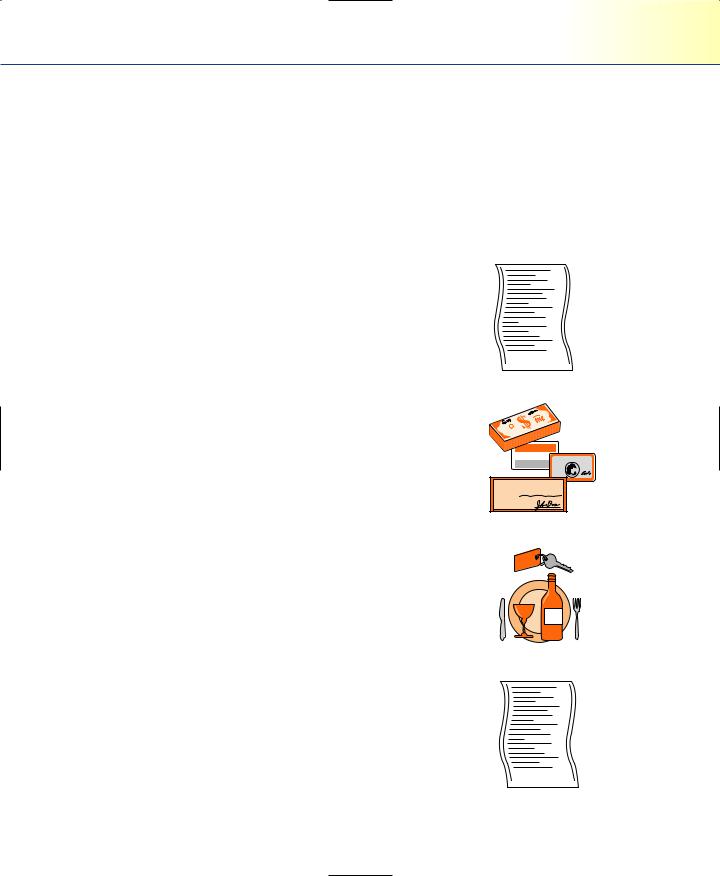
The Rooms Side of the House |
309 |
end of yesterday with today’s balance. He or she verifies that the balance is the correct result of deducting all payments from yesterday’s balance and adding all of today’s charges. This process, summarized graphically in Figure 10.3, not only verifies today’s closing balance of guest accounts owed to the hotel but also systematically reviews all transactions when an error in the balance is found. For this reason, the night auditor’s job is important, requiring intelligence, training, and integrity. In most properties, even smaller ones, the night audit process is automated but still requires individuals to oversee the computerized processes and reports.
ADD:
Yesterday’s closing balance of accounts owed by + guests to the hotel
Less:
Payments received today against accounts – (say $4,340.97)
$64,217.91
VISA MAIN BANK
23983321
John Doe
10/22 00
Security Plan
23983320
PLUS:
All charges made today to hotel or guest accounts + (say $17,614.86)
EQUALS:
Today’s closing balance of accounts owed by guests = to the hotel
$77,491.80
Figure 10.3
A schematic view of the night audit process.

310 |
Chapter 10 Hotel and Lodging Operations |
AUTOMATION OF THE FRONT OFFICE
Although the main elements of personal service—a smile, a friendly greeting, and courteous treatment of the guest—cannot readily be automated, much of the clerical work has been greatly simplified in most hotels by the installation of a property management system (PMS). The PMS improves operational efficiency by eliminating repetitive tasks and improves service by providing information more quickly and accurately. At the same time, the PMS improves operational control. We need to understand the PMS in order to see how the front office functions.
The computer program (or programs) that make up the PMS prompt the clerk to follow an appropriate work sequence for every task. For instance, when a guest checks in to the hotel, the clerk begins by “telling” the computer whether the guest has a reservation or not. If the guest has a reservation, the clerk need only type in the name and the computer will retrieve the reservation and automatically print out the necessary records. In most cases, the guest is simply asked to sign his or her name. If the guest doesn’t have a reservation, the clerk gets the necessary information, following the format on the front-desk computer screen (depicted in Figure 10.4), and types it in.
G U E S T I N F O R M A T I O N |
R O O M D E S I G N A T I O N |
NAME: Tom Farmer |
ROOM TYPE: Dbl |
PHONE: 612-999-1212 |
RACK RATE: 86.00 |
ADDRESS: 6199 Thorton Blvd |
FOLIO RATE: 70.00 |
Minneapolis, MN |
# NIGHTS: 2 |
SPECIAL REQUEST: Crib |
EXTRAS: Crib-NC |
MARKET: 12-15B |
|
CREDIT: |
|
CREDIT CARD: Diners Club #99552211887712
Exp. 9/1/06
FOLIO LIMIT: $500
Guest Walk-In Display
(1) Room Info (2) Guest Info (3) Additional Info
(4) Post Charge or Credit (5) Change or Update
(6) Check In
02 27 15:07
Figure 10.4
The walk-in registration screen. Note the menu across the bottom of the screen that prompts the clerk as to the choices of activity appropriate to dealing with a walk-in.

The Rooms Side of the House |
311 |
When the guest checks out, the computer once again presents a screen with prompts (note the menu at the bottom of the screen in Figure 10.5) that will help the clerk to move through the appropriate sequence, verifying the balance with the guest, posting any late charges, and accepting payment by credit card or cash or by billing the account directly if prior arrangements have been made. Figure 10.5 shows the screen the clerk sees when checking out Mr. Farmer. An increasing number of hotels provide guests with the option of an automated check-out system utilizing the telephone or television in the guest room through which the guest can access their account and approve the ending balance. Hotels may also deliver a hard copy of the guest’s folio during the night prior to check-out. The folio, which lists all guest charges and the predetermined method of payment indicated at check-in, is quietly slipped under the guest room door, typically in the early morning hours. If there are no changes, the guest can indicate so through the automated system and save time in leaving the hotel. It should also be mentioned that a number of hotel chains are testing the option of automated check-in for guests. Typically involving a lobby kiosk, the guest interfaces with a computerized system that prompts him or her through the registration process.
G U E S T I N F O R M A T I O N |
R O O M D E S I G N A T I O N |
NAME: Tom Farmer |
ROOM TYPE: Dbl |
PHONE: 612-999-1212 |
RACK RATE: 86.00 |
ADDRESS: 6199 Thorton Blvd |
FOLIO RATE: 70.00 |
Minneapolis, MN |
# NIGHTS: 2 |
SPECIAL REQUEST: Crib |
EXTRAS: Crib-NC |
MARKET: 12-15B |
|
CREDIT: |
|
CREDIT CARD: Diners Club #99552211887712 |
|
Exp. 9/1/06 |
|
FOLIO LIMIT: $500 BAL 270.13
Guest Check Out Display
(1) View Folio (2) Posting (3) Transfer (4) Payment
(5) Check Out (6) Print Folio
02 29 11:42
Figure 10.5
The check-out screen.
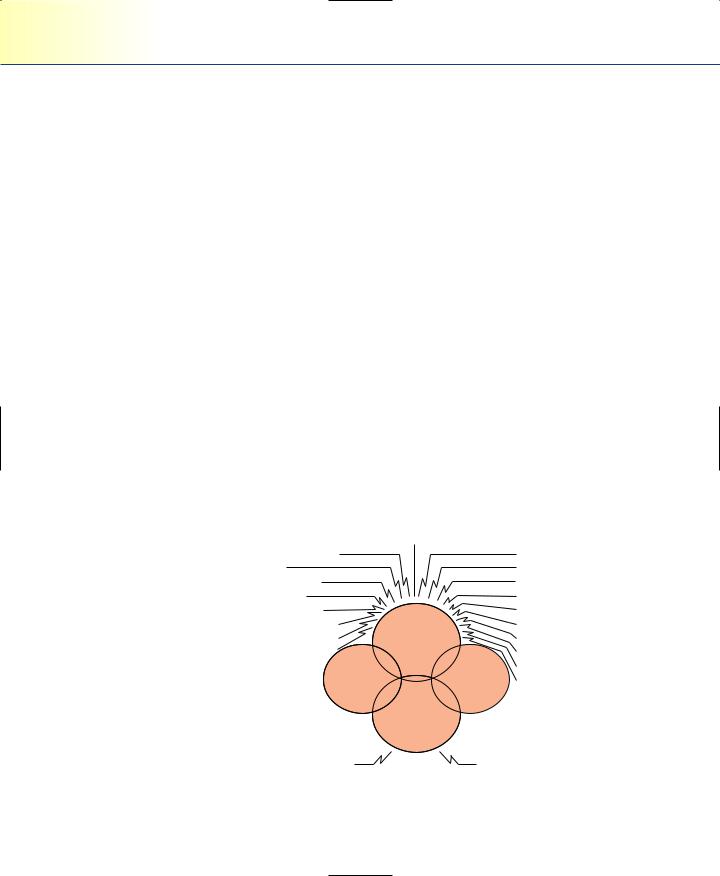
312Chapter 10 Hotel and Lodging Operations
Even more advanced is the option for an incoming guest to preregister online. Issued with a hotel smart card, such as a loyalty card, and Internet access, once a guest has preregistered, the hotel can preprogram the allocated room lock with check-in and check-out time information. The system allows guests to use their cards to enter the hotel through special entranceways and gain elevator access to the specific guest floor. Although it is believed that there will always be a need for personal service for guests desiring the human interaction with a front-desk receptionist, the automated alternative is similar to airlines now providing automated check-in for passengers who prefer to save time and forgo the pleasantries.
Where the front-desk computer is interfaced (i.e., electronically interconnected) to other systems, such as restaurant and bar point-of-sale (POS) terminals and a housekeeping department terminal, front-office clerical routines are further simplified. When guests settle a dinner or bar check by charging it to their room number, the cashier in the food or beverage outlet posts this entry on his or her POS terminal, and that posting is automatically entered on the guest’s bill at the front-office terminal. This system ensures that all charges will be posted to the guest’s bill immediately. Manual posting is required for any charges that are not automatically handled by the system. In properties that do not have departments such as food and beverage interfaced to the frontoffice system, those charges are also posted manually. This is more time-consuming for both departments and is also likely to lead to more mistakes.
In much the same way, when housekeeping is interfaced, at the time the guest checks out, the room shows up as “vacant and dirty” on the housekeeping terminal,
|
POS |
|
|
Central Reservation System |
|
|
Guest Room Bars |
Telephone System |
|
|
Guest Room Safes |
Call Accounting System |
|
|
Guest Pay Movies |
Credit Card Readers |
|
|
Word Processors |
Credit Card/Settlement |
|
|
TV-Based Check-out |
Guest Room Locking System |
|
|
Yield Management |
Self Check-In/Out Machines |
Front |
|
In-Room Shopping |
Energy Management System |
Office |
|
Fax Services |
|
|
||
|
|
F/B |
Voice Messaging |
|
Marketing |
Cash Dispensing |
|
|
Management |
||
|
Back |
|
|
|
Office |
|
|
Electronic Time Clocks |
|
Corp. Reporting |
|
Figure 10.6
Hotel property management system interfaces. (Source: Chervenak, Keane and Company.)

The Rooms Side of the House |
313 |
indicating that the room needs to be cleaned. When housekeeping personnel have cleaned the room, they make the appropriate entry and the room is automatically added to the ready-to-rent total in the front-office terminal. Where housekeeping is not interfaced, lists of “on change” and “ready-to-rent” rooms are usually communicated back and forth by phone.
Most chain or franchised properties interface their front office not only with other departments but also with their group’s central reservation system (CRS). This permits the CRS to determine room availability directly and automatically from the individual property. This is an important time-saver for front-office staff and helps maximize the usefulness of the CRS to the individual property. The PMS can also be used to automate and integrate a number of other functions in the hotel, as shown in Figure 10.6.
RESERVATIONS AND YIELD MANAGEMENT
Traditionally, the hotel industry has looked at occupancy as a measure of success. Another indicator of operational success that we have always consulted is the average rate per rented room (the average daily rate, or ADR). Yield management puts these two together and, using forecasting based on the history of past sales, sets out to get the best combination of occupancy and ADR.1 Yield management, then, involves varying room rates according to the demand for rooms in any given time period. The argument is that when the hotel is going to be full, it makes no sense to sell any rooms at special discount rates. On the other hand, on a night when the hotel is definitely not going to fill, selling a room at a discounted price is better than not selling it at all.
Going beyond maximizing rates, hotels are using yield management to take more multiple-night (instead of single-night) reservations during busy periods on the theory that a multiple-night reservation offers less risk of having a vacant room following checkout and thus is worth more to the hotel. A potential guest, therefore, inquiring about room availability for a large event such as the Super Bowl may find that the hotel requires a minimum stay of two to three nights for this high-demand weekend. As with so much in hotel operations, careful employee training is essential to secure an effective yield management system that is operated in a way that will generate maximum revenue but not offend guests. Yield management is discussed further in Chapter 12.
Yield management has been used in a number of other industries, most widely in the airline industry. It can be used by any industry that experiences fluctuating demand, which includes most segments of the hospitality industry. As will be discussed in Chapter 12, the extraordinary growth of individuals using the Internet in booking hotel reservations, as has been the case with other travel arrangements such as airline reservations, has had a tremendous impact on the marketing and pricing of hotel rooms in all price and size ranges of properties.
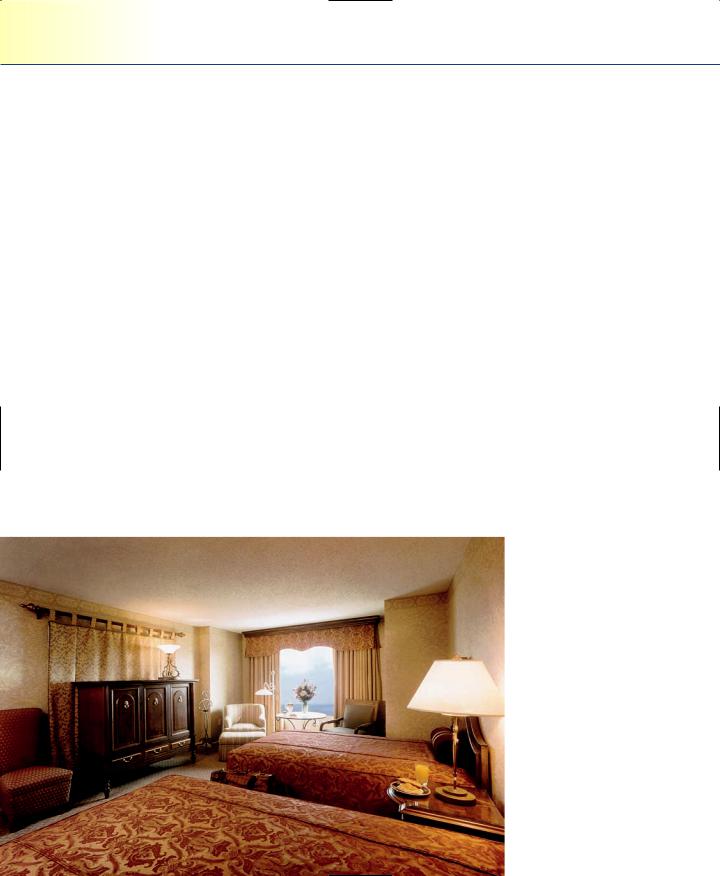
314 |
Chapter 10 Hotel and Lodging Operations |
HOUSEKEEPING
An essential requirement, for both business or leisure travelers staying in limitedservice or luxury properties, is that the guest room be clean. The essential department of housekeeping is as much a production department of a hotel as the front desk and bell staff are service departments. It is clear that without clean rooms to rent, a hotel would have to close. Understanding how important a housekeeping department is to the proper functioning of a hotel, the management should always pay close attention to morale factors such as pay and worker recognition in that department. Because of the physical demands in cleaning between, on average, 16 to 18 rooms per day per housekeeper, safe and injury-free working conditions are also a priority in this department.
The housekeeping department is usually headed by an executive housekeeper. In a smaller property, this role may be held by a housekeeping supervisor. In larger properties, the executive housekeeper will have at least one assistant and several supervisors, generally known as inspectors, who supervise room attendants in designated areas. As hotels have flattened their organizational structures and empowered hourly employees, many properties have substantially reduced the number and role of inspectors, giving housekeepers the responsibility of inspecting their own rooms utilizing a checklist of cleanliness requirements.
The housekeeping department also plays a significant role in purchasing guest room supplies including linens, and guest room amenities. Guest room amenities may range from bars of soap to a full array of toiletries including shampoo, conditioner,
The housekeeping department plays a key role in keeping guest rooms looking clean and attractive. (Courtesy of Caesars Atlantic City.)

The Rooms Side of the House |
315 |
body lotion, sewing kits, and shoe-polishing cloths. Typically, the more extensive array of guest room amenities would be found in full-service and luxury properties. The housekeeping department also purchases equipment necessary to keep the hotel clean such as vacuum cleaners, carpet-care machines, and floor buffers. In addition, to be able to properly do their jobs, housekeeping employees require numerous chemicals, which must be inventoried. These cleaning products include everything from porcelain cleaners for the bathroom to glass cleaners, furniture polish, and carpet shampoos.
In most hotels, housepersons or main or maintenance workers take responsibility for cleaning the halls and public areas (lobby, elevator lobbies, ballrooms, meeting rooms). These employees also play a vital role in maintaining high cleanliness standards for a hotel.
Hotels with their own laundries often assign the supervision of that area to the housekeeping department. Generally, a working laundry supervisor or lead worker handles routine supervision under the executive housekeeper’s general direction. In larger hotels, a laundry manager may well be warranted. Industry Practice Note 10.1 discusses what some hotels are doing to maximize hotel room cleanliness.
TELECOMMUNICATIONS AND CALL ACCOUNTING SYSTEMS
Because the system of accounting for hotels recognizes telephone activity as a separate department for revenue purposes, one often hears about the telephone department. Some hotels have broadened the title of this department to “telecommunications” to reflect not only revenue generated through guest room telephone use and public area phones, but also Internet connection services and faxes sent and/or received by guests. Only in the largest hotels, however, is there really a separate organizational unit to match this designation, whether called the telephone or telecommunications department, and in such hotels it is headed by a manager sometimes referred to as a communications manager or Private Branch Exchange (PBX) manager. The telephone service in smaller properties is handled by a person who also serves as a front-desk clerk. Many smaller properties, particularly those with 100 rooms or fewer and with automatic phone systems, often require the desk clerks to operate the phone system as part of their regular duties.
The increasing availability of voice mail and automated systems in hotels has expanded the services provided to guests—and, increasingly, expected by them. It is now common to provide voice mail in each guest room. In addition to improving the level of service available in the hotel, this has the effect of reducing staffing requirements to take and deliver guest messages. Automated voice-mail systems also minimize the translation needs seen with growing numbers of international travelers.

INDUSTRY PRACTICE NOTE 10.1
Housekeeping
Guest room cleanliness, regardless of the type or segment of hotel property, consistently rates of highest importance to guests. Hotel housekeeping departments are challenged with doing a thorough job of cleaning each guest room while also doing it efficiently—particularly in maximizing speed and productivity. Hyatt Hotels implemented a new approach in 79 hotels across the country aimed at more efficient and targeted housekeeping. The program, called the “Housekeeping Stay-Over Program,” eliminated redundant cleaning tasks in stay-over rooms, which then allows housekeepers to focus on what matters most to those guests staying multiple nights at a Hyatt. The program was initiated from a survey of guests conducted by Hyatt. Guests stated that when first checking in to a hotel, they are most concerned about having a room that is thoroughly and properly prepared. After that, refreshing the room meets their expectations. Hyatt, as with most hotels, was having housekeepers go through the same cleaning process with each and every room, regardless of the room’s status—check-in or stay over. Eliminating the redundant tasks reduced the cleaning time in a stay-over room from about 24 minutes (the average time of cleaning a room) to 15 minutes.
Other hotels have implemented similar changes. The Adam’s Mark Hotel in St. Louis, Missouri, has a “Just Like Home” program. Bed sheets are changed every three days for stay-overs, unless the guest requests otherwise.
Another approach tried by some hotels is team-cleaning as compared to each housekeeper having his or her own rooms. Proponents of this approach claim that there is greater productivity in addition to reduced equipment costs. For example, instead of having a vacuum cleaner for each housekeeper, there can be one per team.
Source: Rob Heyman, “Cleaner Pastures—Shaping Up Hotel Housekeeping Programs,” Lodging Magazine, http://www. lodgingmagazine.com/index.cfm?fm=Article.Detail@aid=113
The prevalent use of cellular telephones has certainly had a detrimental impact on hotel telephone revenue. Hotel telephone rates have typically been a source of guest complaints, and now most guests have a very accessible alternative in using their own cellular phones to bypass in-room telephone options. Facing revenue declines, many hotels have increased surcharges for telephone calls made from the hotel guest room. Some hotels allow local calls at no cost, while others charge anywhere from 50 cents to $1.00 or more for a local call. For long-distance calls, guests may pay a connection fee of about $1.50 and per-minute charges ranging from $1.00 upwards. Hotel operators justify such charges as necessary to cover the costs of the telephone departments, including salaries and equipment. According to PKF Consulting, sales in the telecommunications department dropped another 7.6 percent in 2005, which was the fifth consecutive year of revenue declines. While there are no regulations regarding what hotels can charge for
316

The Rooms Side of the House |
317 |
direct-dialed calls, hotels are required to make information about telephone rates readily available to guests. Most hotels place rate cards next to the room telephones. The decline in telecommunications revenue is based on the increased use of cell phones, calling cards, and the growing number of hotels that offer free Internet access to guests. Combined with disgruntled guests who want to avoid hotel surcharges for telephone use, the revenue stream from telecommunications could continue to spiral downward.2
Not only do guests want to have an array of business services available through the hotel guest room; today’s traveler expects in-room entertainment. The concept of in-room entertainment has expanded significantly in the last 15 years. Before the 1990s, a few television networks with decent reception met or exceeded the expectations of most hotel guests. Today, with individuals accustomed to satellite dishes or expanded cable networks at home, the traveler expects the same while away from home. In addition to wireless High Speed Internet Access (HSIA), technology has provided the capabilities to provide on-demand TV, video, and an assortment of in-room games. Perceived by guests as services provided by the hotel, these entertainment options may be the solution to increased guest room revenue opportunities to offset the decline in telecommunications.
UNIFORMED SERVICES STAFF
Uniformed staff who perform personal services for the guests are part of the rooms division. These include the bell staff, concierge, security, valet, and garage. Of course, the property classification, size, and location determine whether there is a need for these positions. We will discuss the bell staff next. Industry Practice Note 10.2 discusses the concierge.
The Bell Staff. Most limited-service hotels do not provide a bell staff because most of their guests prefer to room themselves. On the other hand, the bell staff plays an important role in the larger and more luxurious hotels. The process of rooming a guest includes more than just carrying luggage and showing a guest to a room. Rather, it begins when the front-desk receptionist assigns a room. At this point, a member of the bell staff takes charge, welcoming the guest in both word and manner. While escorting the guest to his or her room, the bell attendant has an excellent opportunity to acquaint the guest with the services and features of the hotel. Such information may include brief details about the food and beverage outlets in the hotel, as well as the available recreational amenities such as a swimming pool and fitness center and hours of operation. On entering the room, the bell attendant can provide a great service in demonstrating the room’s operations and features. He or she can show the guest how to operate the air-conditioning and turn on room and bath lights. The bellperson will usually turn on the television and run through the channels and networks available.

INDUSTRY PRACTICE NOTE 10.2
The Concierge
In luxury hotels, the concierge offers the guests important services, including giving directions to local attractions, securing tickets to shows, and recommending local restaurants, tours, and other entertainment. The concierge knows about local transportation, tour schedules, and nearly any other information a tourist might want. The concierge, at one time more common in Europe, is increasingly being found in North American hotels as well as around the world. Conversations with a concierge at most any hotel will reveal stories of their most memorable requests, not all of which they were able to accommodate. Most requests are relatively common in nature, however, and restaurant reservations are among the most frequently encountered.
The professional organization for hotel concierges is known as Les Clefs d’Or. This is an international association of men and women concierges which first formed in 1929 when eleven concierges from the grand hotels of France realized that they could operate more effectively as a group than individually. Additional chapters of Les Clefs d’Or followed around the world. In April of 1952, delegates from nine countries gathered in Cannes to hold the first congress. The goal of Les Clefs d’Or is to help improve the quality of service provided by the concierges in their hotels and to ensure that the profession is given the recognition it deserves. The association encourages friendship and solidarity among its members and also teaches them to continually improve their professional skills. If you meet a hotel concierge wearing the association’s “golden keys” pin on his or her lapel, you will know that this experienced concierge has achieved this recognition through Les Clefs d’Or.
For more information on Les Clefs d’Or, visit http://www.lcdusa.org. This Web site for Les Clefs d’Or USA provides interesting links such as “Concierge Characteristics,” “Facts and Figures,” and “Historical Perspective.”
The Valet/Garage. As guests drive up to a hotel property, arriving in the motor lobby or porte-cochere (a covered entranceway), another important first impression is the valet who will be parking the guest’s car. Many hotels outsource the valet parking operation to companies that specialize in the business of parking and retrieving guest cars. There are many liability issues associated with valet parking in any type of business. Cars are expensive commodities to be replaced or repaired. In addition, there are safety issues in employees driving the vehicles of others. For these reasons, it is not uncommon to find that the valet parkers are actually employees of a parking service that the hotel pays to run its valet operation. Many hotels offer valet parking in addition to the option of self-parking in the hotel’s garage or parking area. If the hotel does not own a garage or parking lot, it may arrange with a nearby garage for guest parking. Comprehensive legal agreements with clearly specified indemnity arrangements in the event of car theft, loss, or damage are of utmost importance in working with
318

The Rooms Side of the House |
319 |
valet operations. It is also important that the valet/garage operations adhere to the service standards of the hotel. Even if the valet/garage services are outsourced, for seamless service these operations must provide a quality experience for guests.
Gift Shop/Retail Operations. Hotels are increasingly finding a new revenue stream through retail store operations sometimes in conjunction with an online ordering option. Providing much more than the typical sundry or gift shop, hotels are finding consumers who want to buy everything from high-end bed linen and luxury mattresses to the best in bathrobes and spa products. The W Hotel in Union Square, Los Angeles, offers for sale almost anything in the hotel. The Charles Hotel in Cambridge, Massachusetts will sell artwork to guests—even pieces hanging in the hotel. A number of hotels have received added notoriety from celebrities who have publicized the hotels at which they prefer to shop.3
SECURITY
In a hotel of any size, security is a major concern. In a large hotel, security may be a department, but no matter what its organizational status, security has become the focus of top management attention.4 Security came forcefully to the attention of hotel operators in 1976 when a well-known singer, Connie Francis, was raped at knifepoint in a Long Island motel. That such a terrible event could happen in a lodging property was enough to gain management’s attention—but the $2.5 million awarded to the victim by the jury underlined that concern. The door in her room appeared to be locked but could be opened. In fact, security practices in many hotels had become lax. The jury found that the hotel had not exercised reasonable care. The question of reasonable care has been a continuing concern for operators since the Francis case. In recent years, bad publicity on television and in the newspapers has heightened hotel managers’ attention to this problem.
In a survey of over 42,000 U.S. hotels conducted in 2006 by the American Hotel & Lodging Association and Smith Travel Research, it was found that hoteliers are increasingly improving critical aspects of hotel security. Many of these improvements were the result of a new generation of hotels now in operation as well as renovations that have incorporated security features. The survey found an increase in the use of closed-circuit cameras (CCTV), enhanced interior and exterior lighting, and greater access control through card readers including vehicle access to garages and parking areas.5
Many hotel chains have increased security with the elevated terror governmentissued alerts. One example, Starwood Hotels & Resorts, parent of the Sheraton, Westin, and “W” chains, follows this system. Measures include increased security at entrances,

320Chapter 10 Hotel and Lodging Operations
loading docks, and in hotel garages and more scrutiny of unattended bags and cars. Armed guards are stationed at some properties. At the highest alert level, hotels in the company will typically not store luggage. In some areas of the world where terrorism is a more prevalent threat, such as the Middle East, hotels have installed metal detectors at entrances as standard equipment. In Israel, the government has made gas masks available free or for a discount to guests.6
Most hotel guests today do not get alarmed by security measures taken by hotels. In fact, most would perceive a strong positive relationship between good service and good security. As hotels strive to provide high-level, comprehensive security, there are technical components as well as management components that must be addressed. The matter of security can be approached as a technical problem as well as a management problem. Both approaches are probably necessary to reach a solution.
Technical Problems in Security. The largest technical commitment on the part of hotel operators has been the replacement of the metal key with electronic or cardbased locks, a practice that is now being mandated by many franchise systems. A new combination is electronically or mechanically encoded on the key card with each guest registration. The card contains a magnetic strip that allows it to work (this is why these are commonly referred to as “magstrip” systems). The lock in the guest room door is reset electronically by the first entry of the electronic or card key. In the case of an online system, the door is reset from the front desk at the time of registration. Where installation of new key systems is not economically feasible, removal of room numbers from the keys, to be replaced by coded letter or number identification systems, is a minimum requirement. The guest room key and lock are an obvious and essential first line of defense for the guest’s personal security. Hotels are beginning to move beyond the magstrip systems now, and many have introduced “smart card” technology, in which the same card that allows guests into their rooms also serves as a guest identification card and can be used for room charges. Contactless smart card technology, now available, does not even require that the key card be put into the lock. Instead, one can just approach the lock and the door opens.7 The industry is also rapidly moving toward the use of biometric locking systems that can recognize an individual’s fingerprint, whether it is for a guest to gain access to his or her room or to the in-room safe. A quick thumb scan avoids the use of any key or card.
Managerial Problems in Security. Management’s problem is not just to protect the guest; the question of high damage settlements must be weighed, too. A minimal approach to ensuring that a hotel has exercised reasonable care for the guest’s safety begins with a professional assessment, a broad overview of the hotel and the security of its guests and their property. With this overview in hand, the hotel management can take
